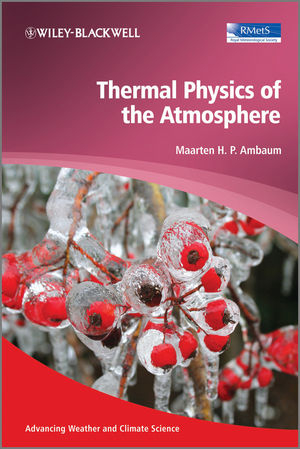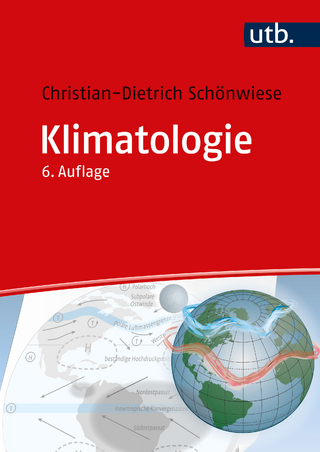
Thermal Physics of the Atmosphere
John Wiley & Sons Inc (Verlag)
978-0-470-74515-1 (ISBN)
Thermal Physics of the Atmosphere offers a concise and thorough introduction on how basic thermodynamics naturally leads on to advanced topics in atmospheric physics.
The book starts by covering the basics of thermodynamics and its applications in atmospheric science. The later chapters describe major applications, specific to more specialized areas of atmospheric physics, including vertical structure and stability, cloud formation, and radiative processes. The book concludes with a discussion of non-equilibrium thermodynamics as applied to the atmosphere.
This book provides a thorough introduction and invaluable grounding for specialised literature on the subject.
Introduces a wide range of areas associated with atmospheric physics
Starts from basic level thermal physics
Ideally suited for readers with a general physics background
Self-assessment questions included for each chapter
Supplementary website to accompany the book
Maarten H. P. Ambaum is the author of Thermal Physics of the Atmosphere, published by Wiley.
Preface ix Useful data xi
1 Ideal gases 1
1.1 Thermodynamic variables 1
1.2 Microscopic viewpoint 6
1.3 Ideal gas mixtures 10
Problems 14
2 The first and second laws 17
2.1 Work 17
2.2 Energy conservation: the first law 21
2.3 Entropy and the second law 23
2.4 Boltzmann entropy 27
2.5 Entropy and probability: a macroscopic example 30
2.6 Entropy and probability: a stochastic example 34
Problems 36
3 General applications 39
3.1 Thermodynamic potentials 39
3.2 Heat capacity 44
3.3 Properties of ideal gases 47
3.4 van der Waals’ gases 50
3.5 Open systems: enthalpy flux 53
3.6 Latent heat 55
3.7 Turbulent energy fluxes 57
3.8 Potential temperature 60
Problems 63
4 The atmosphere under gravity 67
4.1 Geopotential 67
4.2 Hydrostatic balance 69
4.3 Adiabatic lapse rate 74
4.4 Buoyancy 77
4.5 Dry static energy and Bernoulli function 81
4.6 Statistical mechanics 84
Problems 89
5 Water in the atmosphere 93
5.1 The Clausius–Clapeyron equation 94
5.2 Calculation of saturated vapour pressure 97
5.3 Humidity variables 100
5.4 Moist static energy 104
Problems 106
6 Vertical structure of the moist atmosphere 109
6.1 Adiabatic lapse rate for moist air 109
6.2 Entropy budget for saturated air 112
6.3 Finite amplitude instabilities 115
6.4 Vertical structure in thermodynamic diagrams 117
6.5 Convective available potential energy 121
7 Cloud drops 125
7.1 Homogeneous nucleation: the Kelvin effect 125
7.2 Heterogeneous nucleation: the Raoult effect 131
7.3 K¨ohler theory 132
7.4 Charge-enhanced nucleation 137
7.5 Droplet growth 141
Problems 151
8 Mixtures and solutions 153
8.1 Chemical potentials 153
8.2 Ideal gas mixtures and ideal solutions 155
8.3 Raoult’s law revisited 158
8.4 Boiling and freezing of solutions 159
Problems 162
9 Thermal radiation 165
9.1 Thermal radiation and Kirchhoff’s law 165
9.2 The Stefan–Boltzmann and Wien displacement laws 168
9.3 Global energy budget and the greenhouse effect 170
9.4 Horizontal variations 175
9.5 Radiative intensity 177
9.6 Radiative transfer 180
9.7 Radiative-convective equilibrium 185
9.8 Thermodynamics of a photon gas 191
9.9 Derivation of the Planck law 195
Problems 200
10 Non-equilibrium processes 203
10.1 Energetics of motion 203
10.2 Diabatic effects and the second law 208
10.3 Thermodynamics of forced dissipative systems 213
10.4 Climate thermodynamics 215
Problems 220
Appendix A Functions of several variables 221
Appendix B Exergy and thermodynamic stability 223
Appendix C Thermodynamic diagrams 227
Appendix D Relationship between energy density and energy flux 233
Index 235
| Reihe/Serie | Advancing Weather and Climate Science |
|---|---|
| Verlagsort | New York |
| Sprache | englisch |
| Maße | 175 x 252 mm |
| Gewicht | 576 g |
| Themenwelt | Naturwissenschaften ► Geowissenschaften ► Allgemeines / Lexika |
| Naturwissenschaften ► Geowissenschaften ► Meteorologie / Klimatologie | |
| Naturwissenschaften ► Physik / Astronomie ► Angewandte Physik | |
| ISBN-10 | 0-470-74515-0 / 0470745150 |
| ISBN-13 | 978-0-470-74515-1 / 9780470745151 |
| Zustand | Neuware |
| Informationen gemäß Produktsicherheitsverordnung (GPSR) | |
| Haben Sie eine Frage zum Produkt? |
aus dem Bereich


